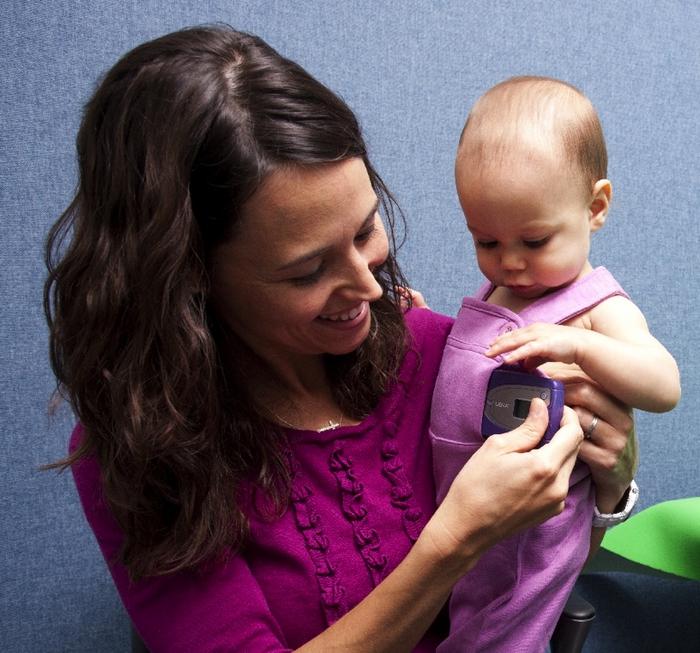In the first large-scale observation with human coding of infant vocalizations using all-day home recordings, babies of all ages from birth up to a year old squealed and growled in significant cluster patterns, suggesting the babies may have been actively engaged in noisemaking play and sound practice, according to a study published May 29, 2024 in the open-access journal PLOS ONE by Hyunjoo Yoo from the University of Alabama, Pumpki Lei Su from the University of Texas at Dallas, and colleagues.

Credit: Children’s Healthcare of Atlanta (CHOA), CC-BY 4.0 (
In the first large-scale observation with human coding of infant vocalizations using all-day home recordings, babies of all ages from birth up to a year old squealed and growled in significant cluster patterns, suggesting the babies may have been actively engaged in noisemaking play and sound practice, according to a study published May 29, 2024 in the open-access journal PLOS ONE by Hyunjoo Yoo from the University of Alabama, Pumpki Lei Su from the University of Texas at Dallas, and colleagues.
In their first year of life, babies spend a remarkable amount of time vocalizing—both responding with noises to parents and caregivers, as well as self-directed babbling that could be considered vocal play, or exploration. Researchers have identified the most common baby phonation categories as vocants, or vowel-like sounds; squeals; and growls. Here, Yoo, Su, and colleagues investigate whether babies group specific noises in a non-random way, which would suggest practice or play.
The authors analyzed recordings from 130 English-learning, normally-developing babies recorded all day in their own homes in their first year of life by caregivers (taken from a larger study conducted by the Marcus Autism Center, Children’s Healthcare of Atlanta, and Emory University School of Medicine). 21 five-minute samples were randomly chosen from each infant recording. The authors parsed each vocalization made in every sample into vocants, squeals, and growls (as well as “other” sounds).
40 percent of all analyzed squeals and growls appeared in significant clusters across all infants. Over 60 percent of the 5-minute sessions showed a significant amount of clustering focusing on either squeals or growls, not both in one session. 87 percent of infants showed at least one age where their recordings had significant squeal clustering and at least one age where their recordings had significant growl clustering, with no infants demonstrating no clustering.
The authors note their sound categorizing approach, while enabling them to collect a large amount of data, likely oversimplified complexities and nuances in vocalizations. However, the quantitative dataset gathered here is sufficient to see clear patterns in individual babies as well as across the entire group, suggesting a possible pathway for language development warranting further investigation.
The authors add: “Active vocal exploration and vocal category formation are fundamental to subsequent language development. The present study represents the first empirical investigation of early vocal category formation. Infants not only spontaneously produce speech-like vocalizations, but also actively explore and practice different types of vocalizations from the first months of life.”
#####
In your coverage please use this URL to provide access to the freely available article in PLOS ONE:
Citation: Yoo H, Su PL, Ramsay G, Long HL, Bene ER, Oller DK (2024) Infant vocal category exploration as a foundation for speech development. PLoS ONE 19(5): e0299140.
Author Countries: USA, Austria
Funding: The research for this manuscript was funded to DKO and GR by the National Institutes of Health grants (R01 DC015108) from the National Institute on Deafness and Other Communication Disorders (https://www.nidcd.nih.gov/). The research for this manuscript was funded to GR by the National Institutes of Health grants (P50 MH100029) from the National Institute of Mental Health (https://www.nimh.nih.gov/). The funders had no role in study design, data collection and analysis, decision to publish, or preparation of the manuscript. Training grant information: Helen Long NICHD T32HD007489 (Role: Trainee) NICHD U54HD090256 (Role: Trainee)
Journal
PLoS ONE
Method of Research
Observational study
Subject of Research
People
Article Title
Infant vocal category exploration as a foundation for speech development
Article Publication Date
29-May-2024
COI Statement
D. K. Oller is an unpaid member of the LENA Scientific advisory board. However, this does not alter our adherence to PLOS ONE policies on sharing data and materials.



